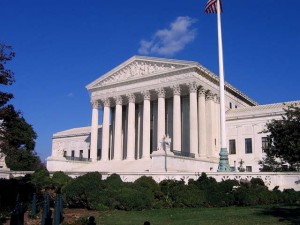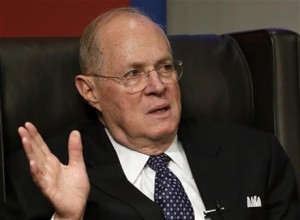Supreme Court upholds Michigan’s ban on racial preferences in university admissions
Daily News Article — Posted on April 24, 2014
 (by Robert Barnes and William Branigin, The Washington Post) – The Supreme Court on Tuesday ruled by a 6-2 vote that Michigan voters had a right to ban affirmative action in their state via a ballot initiative which amended the state’s constitution.
(by Robert Barnes and William Branigin, The Washington Post) – The Supreme Court on Tuesday ruled by a 6-2 vote that Michigan voters had a right to ban affirmative action in their state via a ballot initiative which amended the state’s constitution.
In the controlling opinion, Supreme Court Justice Anthony Kennedy stressed that the case was “not about the constitutionality, or the merits, of race-conscious admissions policies in higher education.” Instead, the case was about “whether, and in what manner, voters in the States may choose to prohibit the consideration of racial preferences in governmental decisions, in particular with respect to school admissions.”
The case, referred to Schuette v. Coalition to Defend Affirmative Action, reviewed a 2006 Michigan ballot initiative that amended the state Constitution to ban the consideration of race or sex in public education, government contracting and public employment. (California, Florida and the state of Washington have similar prohibitions.)
In 2012, the Sixth Circuit Court of Appeals said the Michigan initiative violated the U.S. Constitution’s equal protection clause [in the 14th Amendment]. Because it came in the form of a constitutional amendment, the appeals court said the new rule “reordered the political process” in a way that put special burdens on racial minorities.
“Rather than undoing an act of popularly elected officials by simply repealing the policies they created, Michigan voters repealed the admissions policies that university officials created and took the additional step of permanently removing the officials’ power to reinstate them,” the appeals court wrote. “Had those favoring elimination of all race-conscious admissions policies successfully lobbied the universities’ admissions units, just as racial minorities did to have these policies adopted in the first place, there would be no equal protection concern.”

Oct. 13, 2013 AP file photo showing Supreme Court Justice Anthony Kennedy speaking at the University of Pennsylvania law school in Philadelphia. The Supreme Court on Tuesday upheld Michigan’s ban on using race as a factor in college admissions. The justices said in a 6-2 ruling that Michigan voters had the right to change their state constitution to prohibit public colleges and universities from taking account of race in admissions decisions. The justices said that a lower federal court was wrong to set aside the change as discriminatory. Kennedy said voters chose to eliminate racial preferences because they deemed them unwise. (AP Photo/Matt Slocum)
However, Kennedy argued that the court of appeals’ logic was “inconsistent with the underlying premises of a responsible, functioning democracy.” He wrote, “One of those premises is that a democracy has the capacity–and the duty–to learn from its past mistakes; to discover and confront persisting biases; and by respectful, rationale deliberation to rise above those flaws and injustices. It is demeaning to the democratic process to presume that the voters are not capable of deciding an issue of this sensitivity on decent and rational grounds.”
Kennedy was joined by Chief Justice John Roberts and Justice Samuel Alito. Justices Antonin Scalia and Clarence Thomas agreed with the outcome, but would have gone further to prohibit racial preferences. Justice Stephen Breyer also agreed with the judgment, abandoning the liberal wing of the court.
Justice Sonia Sotomayor dissented, joined by Justice Ruth Bader Ginsburg. Justice Elena Kagan did not take part in the decision. [Justice Kagan recused* herself from the case because she was the Obama administration’s U.S. solicitor general when the case was before the lower courts. *Recuse means to remove (oneself) from participation to avoid a conflict of interest]
Sotomayor, for the first time in her tenure on the court, noted how strongly she disagreed with the decision by reading her dissent from the bench.
Sotomayor wrote in her 58-page dissenting opinion. “For members of historically marginalized groups, which rely on the federal courts to protect their constitutional rights, the decision can hardly bolster hope for a vision of democracy that preserves for all the right to participate meaningfully and equally in self-government.”
An appeals court had said that a Michigan constitutional amendment banning the use of racial preferences in university admissions, approved by 58 percent of the state’s voters in 2006, had restructured the political process in a way that unfairly targeted minorities.
The decision to overturn the ruling was not surprising. At oral arguments, a majority of the justices had been skeptical of the appeals court’s rationale and questioned how requiring the admission process to be color-blind could violate the constitution’s guarantee of equal protection.
Kennedy said the court’s decisions that allow race to be used in limited ways in admission decisions did not dictate that it must be used.
In a sense, the decision does not change what states are allowed to do, and even many conservative states–Texas, for instance–have been adamant that they be allowed to consider race in order to achieve diverse student bodies.
But the court’s decision could encourage opponents of affirmative action to press for action, using the decision as an impetus. California, Florida and the state of Washington already have similar prohibitions on the use of affirmative action in college admissions etc.
At issue at the Supreme Court was language [from Michigan’s constitutional amendment] that says state colleges and universities “shall not discriminate against, or grant preferential treatment to, any individual or group on the basis of race, sex, color, ethnicity, or national origin.”
The U.S. Court of Appeals for the 6th Circuit, which narrowly tossed out the Michigan amendment, ruled that there was a difference between not using affirmative action and banning it in the state constitution. The latter violates the principle that minorities must be allowed to fully participate in creating laws and that “the majority may not manipulate the channels of change so as to place unique burdens on issues of importance to them,” Judge R. Guy Cole Jr. wrote.
His comparison was that while residents of Michigan’s Upper Peninsula may lobby decision-makers to grant preferences to their underrepresented students, minority groups would now have to change the constitution before even having a chance to advocate racial considerations because of the amendment.
Compiled from news reports at CBS News and The Washington Post. Reprinted here for educational purposes only. May not be reproduced on other websites without permission from CBS News and The Washington Post.
 (by Robert Barnes and William Branigin, The Washington Post) – The Supreme Court on Tuesday ruled by a 6-2 vote that Michigan voters had a right to ban affirmative action in their state via a ballot initiative which amended the state’s constitution.
(by Robert Barnes and William Branigin, The Washington Post) – The Supreme Court on Tuesday ruled by a 6-2 vote that Michigan voters had a right to ban affirmative action in their state via a ballot initiative which amended the state’s constitution.
